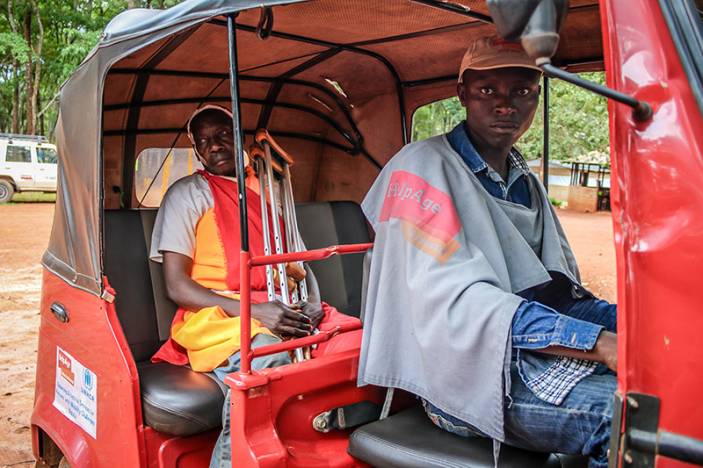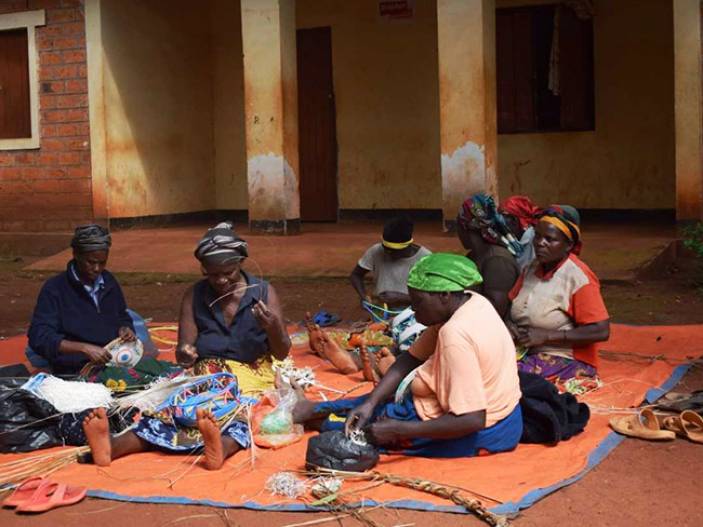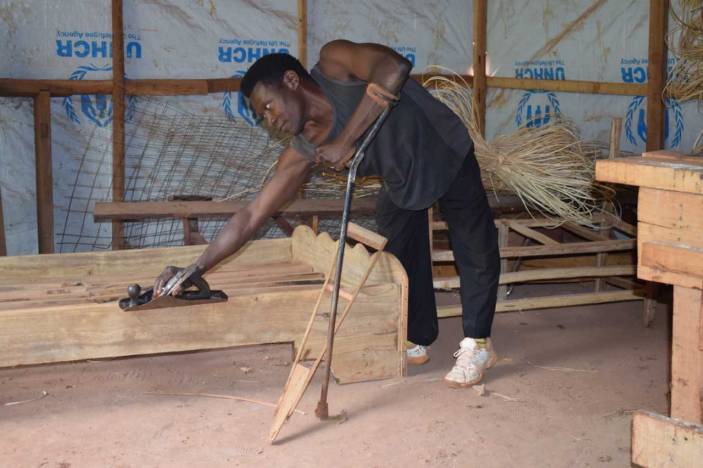
The situation in Burundi has improved greatly over the past few years. In 2015, hundreds of thousands of civilians had to flee their homes to seek refuge in Tanzania, Rwanda or wherever their legs could take them.
However, life for those displaced people remains difficult. Many no longer have a home to return to, as their land and property has been seized by others, and they face a myriad of problems in their new homes, including loss of independence, reduced dignity and control over their lives, and restricted freedom of movement.
“I arrived at the camp alone. I was in distress and in severe pain from an unattended wound on my leg. I did not have someone to care for me. I could not move, I did not know anyone around nor anywhere I could go for treatment,” said 82-year-old Salvatory Savie, at the Nduta camp in Kigoma, north-west Tanzania.
Stories like this and other more horrifying ones are common among the vast majority people in Nduta and Mtendeli camps.
Our response
Responding to the crisis, HelpAge International entered into a partnership with the United Nations High Commission for Refugees (UNHCR) to protect and rehabilitate at risk groups of people in the camps, such as Salvatory, in the camps and surrounding host communities. Now, thanks to a €1.6 million grant from the German Federal Foreign Office to improve the wellbeing of and protect continue.
Among those we help are older people, people with disabilities, women at risk, unaccompanied children, single parents, widows/widowers, and the chronically sick.
The Burundi refugee crisis is characterised by an increased risk of discrimination, harm and exploitation of at-risk groups of people.
There are around 23,000 at-risk people in the two camps. A number of surveys by humanitarian agencies working in the area have shown that more than 60% of these refugees continue to live in dilapidated emergency shelters and tents. They experience bad living conditions, insecurity, discrimination, threats to their dignity and independence, social isolation, and poor mental health.

To add insult to injury, the refugee camps are in areas of high poverty in Tanzania, where the host communities now often find themselves scrambling for meagre and limited natural resources, such as firewood and water, with those who have fled Burundi. This results in sporadic eruptions of tension.
Incentive workers programme
The majority of at-risk people have no relatives, but things are often not better for those accompanied by family members.
While tradition dictate that family should support at-risk relatives, in a refugee scenario even the caregivers face challenges and, as is often seen in these areas, conditions are not suitable for caregivers to safely fulfil that role. This leads to increased risks of neglect as at-risk people struggle to access enough food, cannot be transported to health centres or other service locations, and their concerns are ignored. They may be considered a burden by their families, with some incidences resulting in violence.
Incentive workers are fundamental to ensure the care and safety of PSNs. The majority of the people with specific needs normally have no relatives. However, things are often not better for those accompanied by family members. While traditions expect the caregivers to support PSNs, in a refugee scenario, even the caregivers face challenges and as often seen in these areas, conditions are not suitable for the caregivers to safely fulfil that role. This leads to increased risks of neglect as PSNs struggle to access sufficient food, cannot be transported to health centers or other service locations, and their concerns are ignored. In some incidences PSNs have been considered a burden by their families. There have been cases where this has resulted in violence inflicted upon them by family members.
 Our incentive workers are key to ensuring the care and safety of these people. They are members of the refugee community who volunteer to help identify at-risk people and efficiently deliver essential items to them within the camps. Not only do they support HelpAge in delivering our work, but they get valuable experience working with a humanitarian organisation.
Our incentive workers are key to ensuring the care and safety of these people. They are members of the refugee community who volunteer to help identify at-risk people and efficiently deliver essential items to them within the camps. Not only do they support HelpAge in delivering our work, but they get valuable experience working with a humanitarian organisation.
“One day as I was sitting outside my house, I saw a fellow Burundian approaching my home. At first, I thought he could be one of the neighbours, but he dressed smarter,” explained Savie with a smile.
“When he introduced himself, he said he works with this organisation called HelpAge. I got interested to know what news he has for me. He then told me that he works with HelpAge to identify people with specific needs, such as myself, around the camp. This was the best news I had for months since my arrival.”
Savie explained his condition to the Burundian refugee incentive worker. He told them all the challenges he faces. The incentive worker noted all his requirements. They then asked Savie his personal details so he could register as a “person with a specific need”, which would mean he can get support from HelpAge. The incentive worker then provided him with directions to HelpAge’s community space in the camp.
“After a few days, I was shocked when I saw staff from HelpAge, who invited me to to receive the goods I had listed to be in need of. I received a mattress, bucket, basin, blanket, bar soap, petroleum jelly and slippers. I was also registered to receive cash of 40,000 Tanzanian shillings [US$17],” he said.
“I also received a tricycle that helps me move easily around the camp. It has enabled me to even visit the Red Cross hospital within the camp. Before, it was difficult for me to visit a health centre as my leg and my age would not allow,” he adds.
“The cash has helped me access more food and other items like clothes from the market. With the support from HelpAge and UNHCR, I am now staying at the refugee housing unit. It is safer and warmer at night. I no longer worry about strong winds or heavy rains.”
The new funding from Germany will continue to support the good work being done by the incentive workers delivering much-needed humanitarian support ion the camps. The project is expected to directly benefit more than 87,500 people and will indirectly reach a further 175,000, both in the camps and host communities.
Find out about our work in Tanzania.
